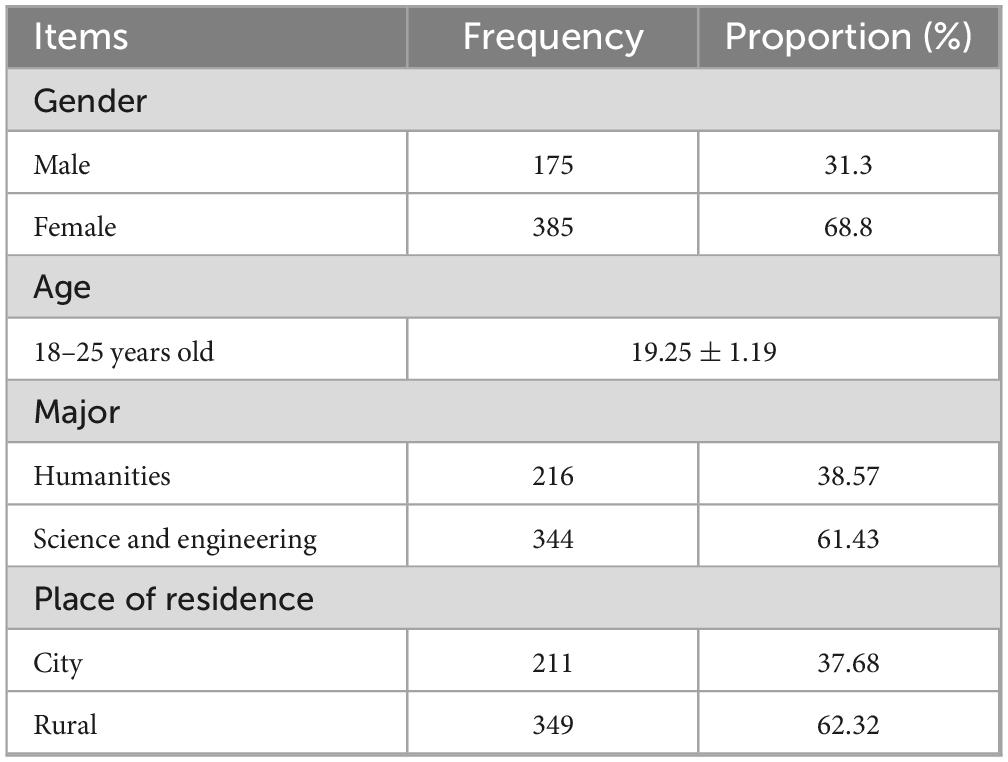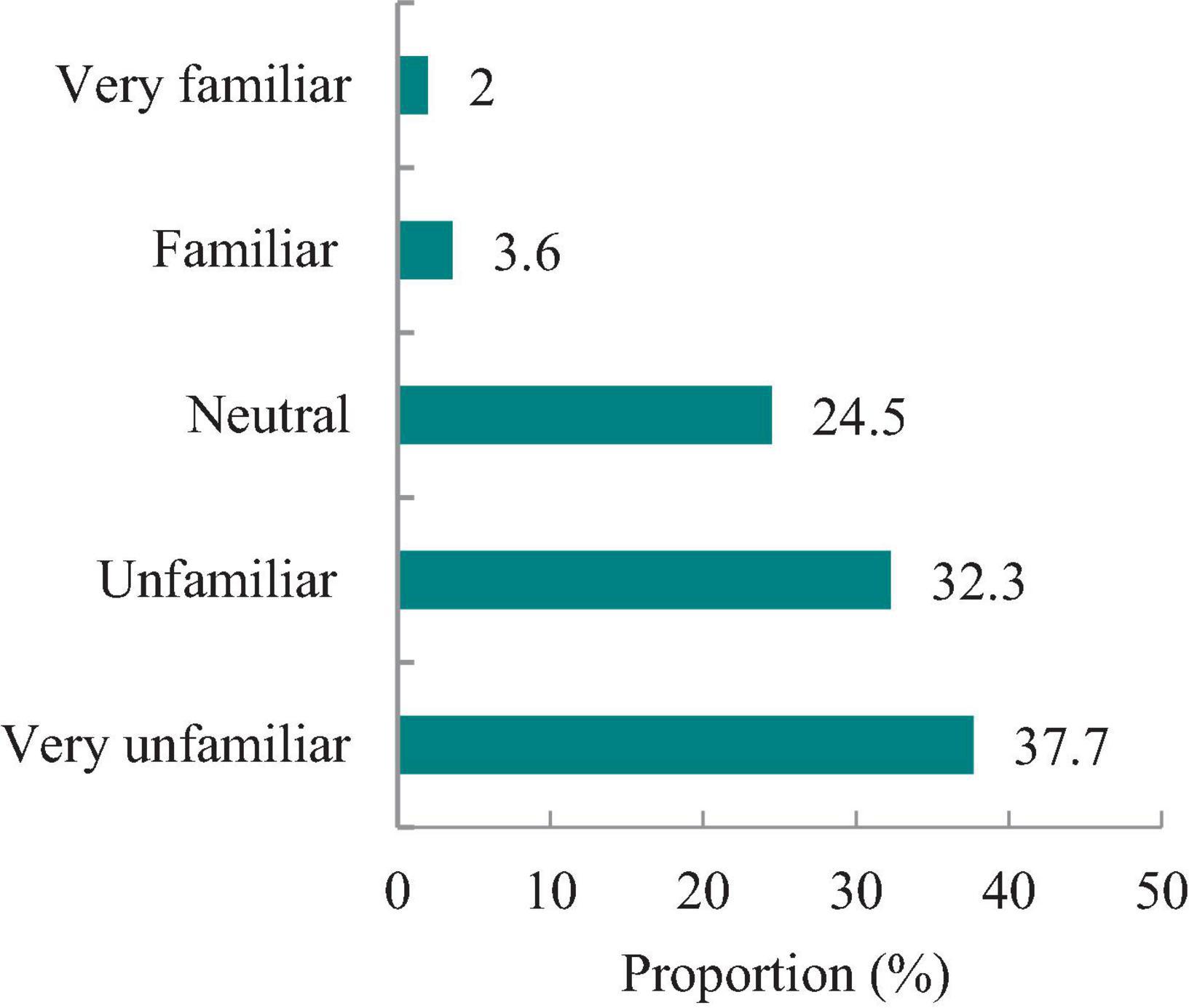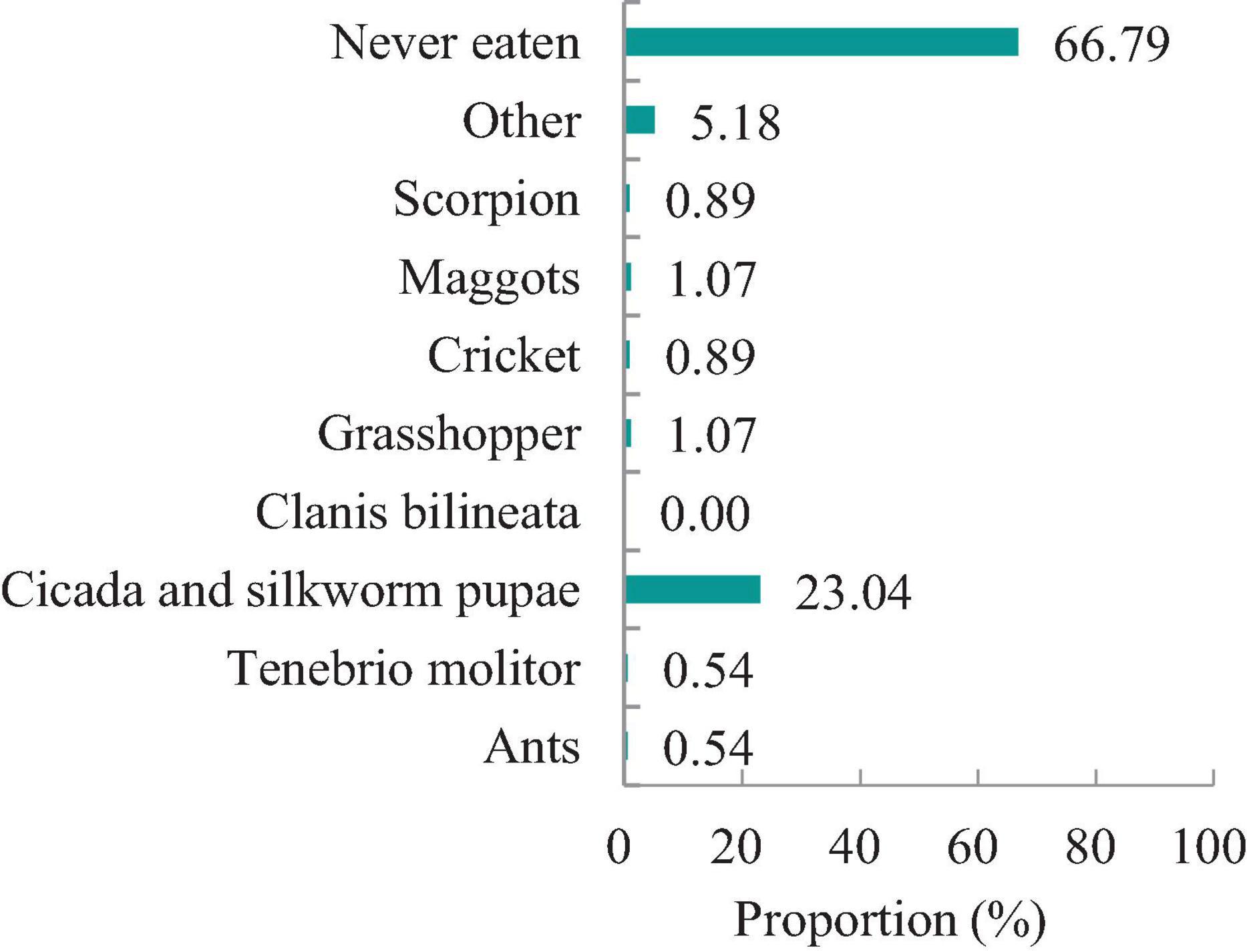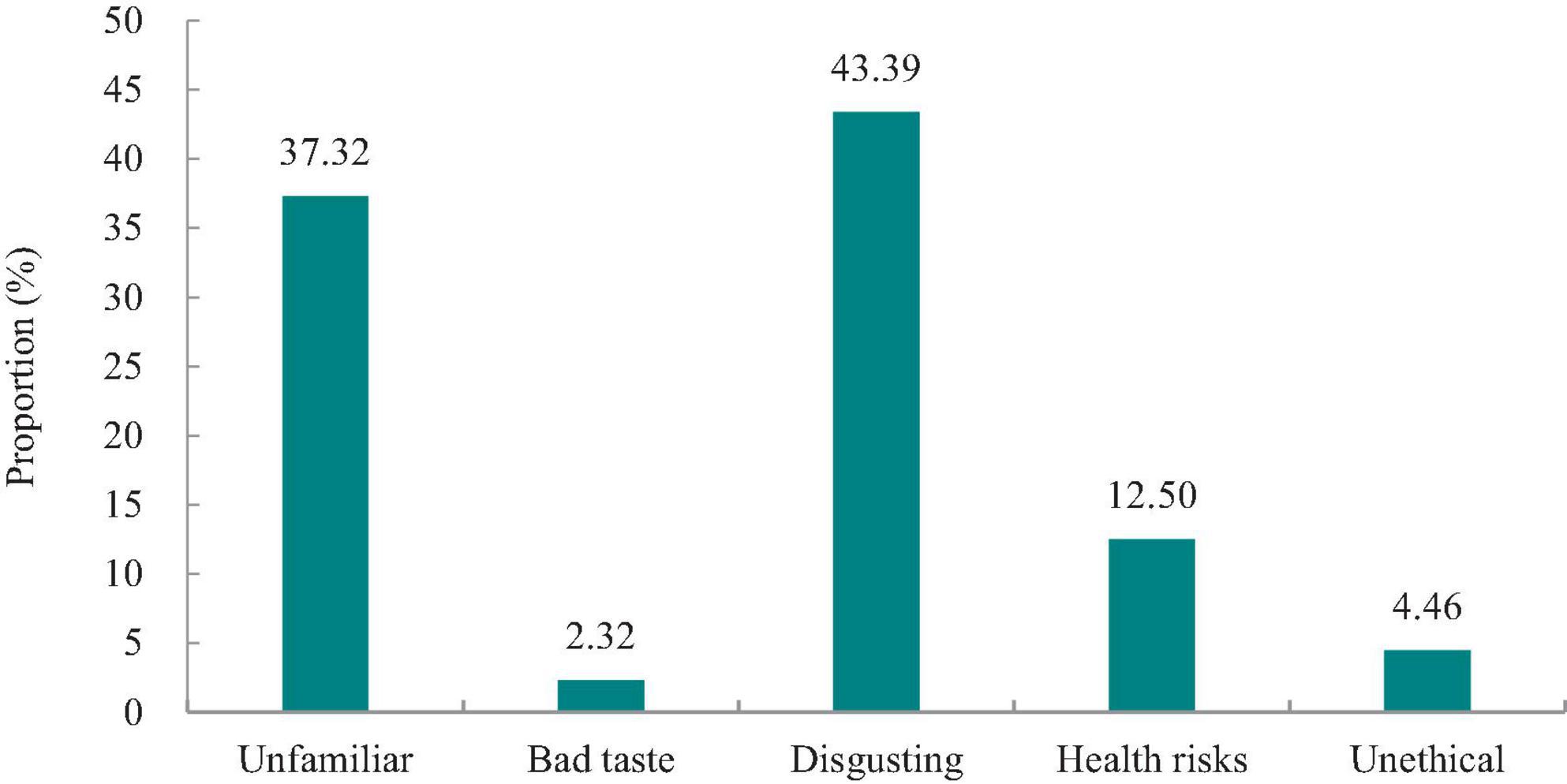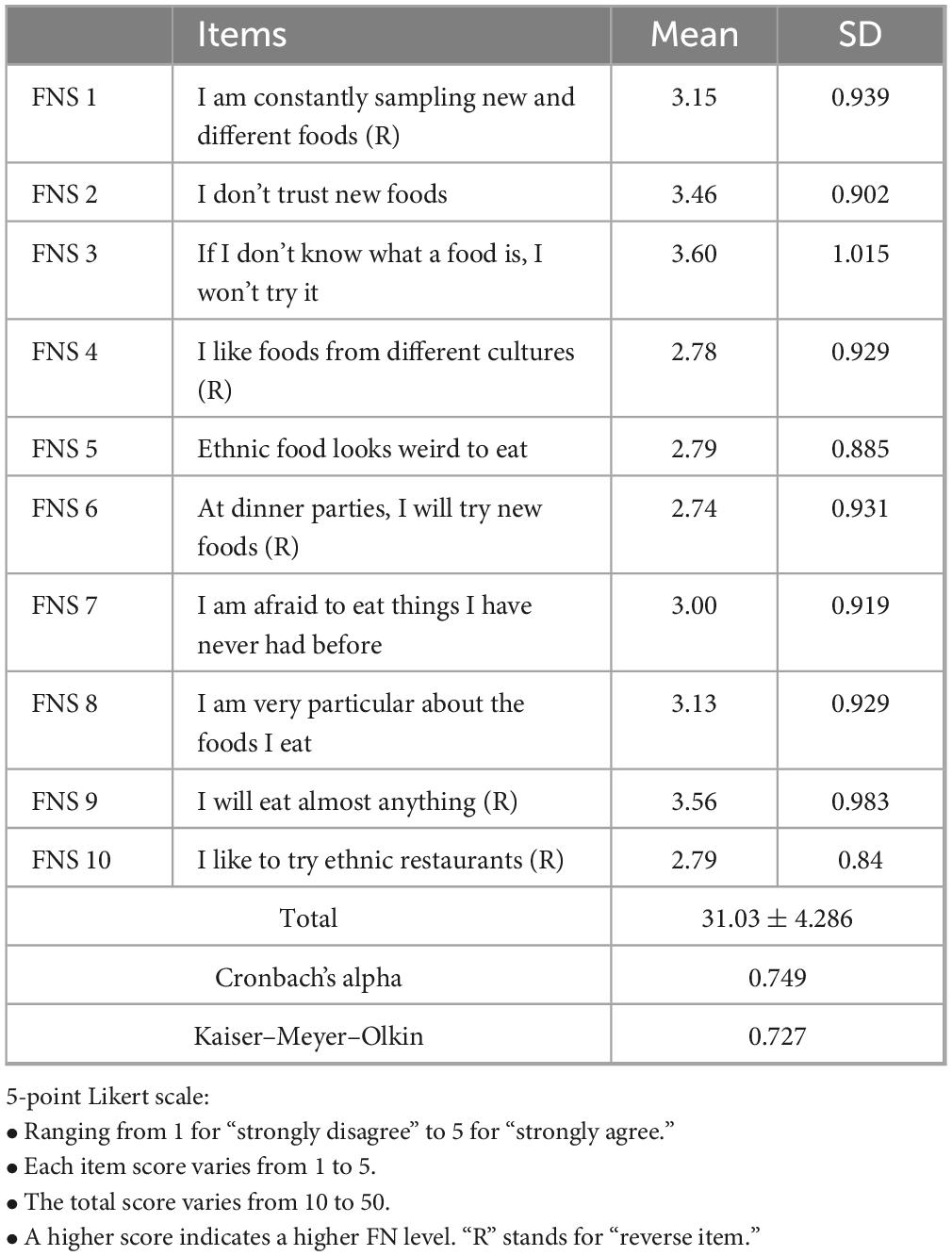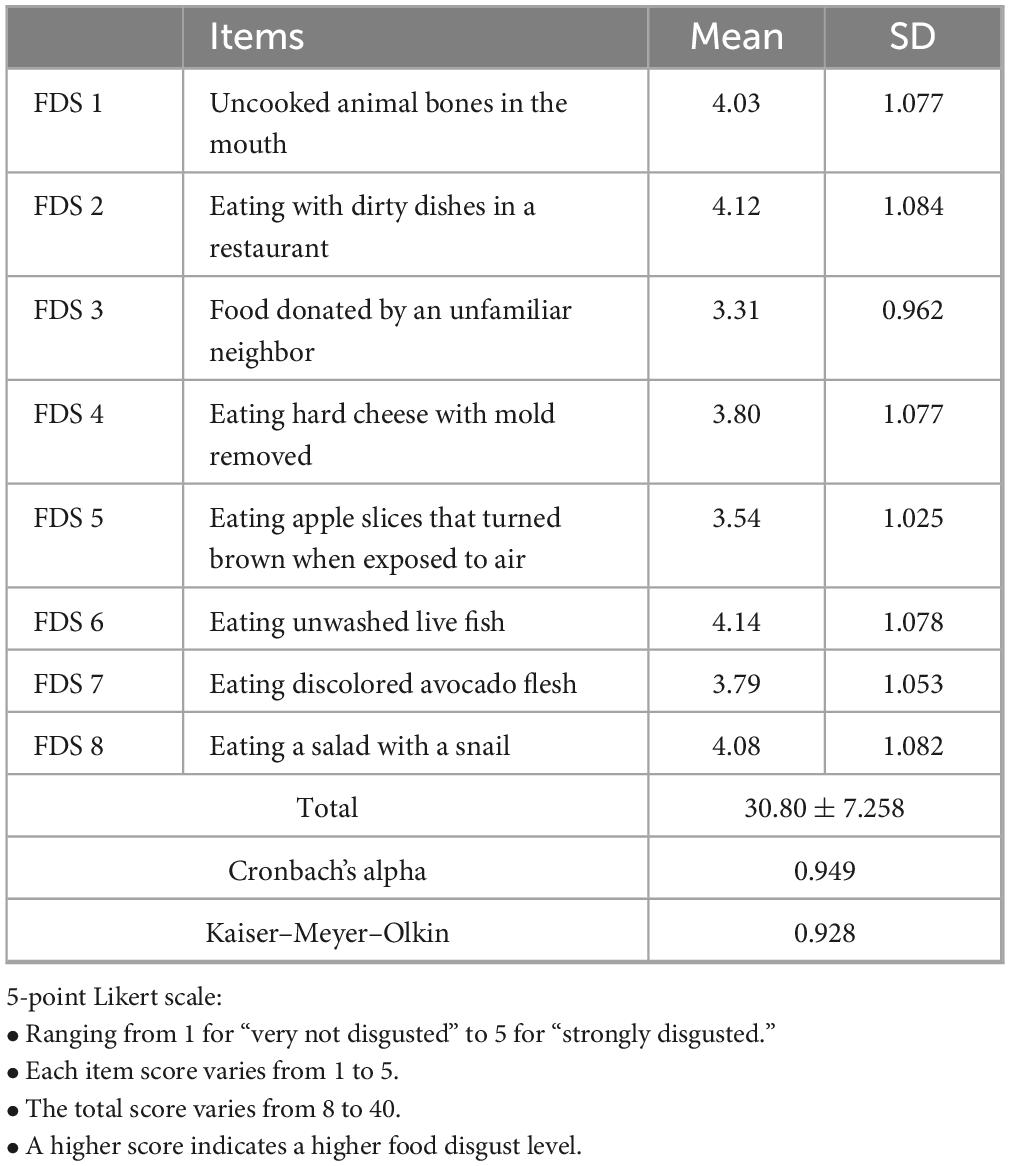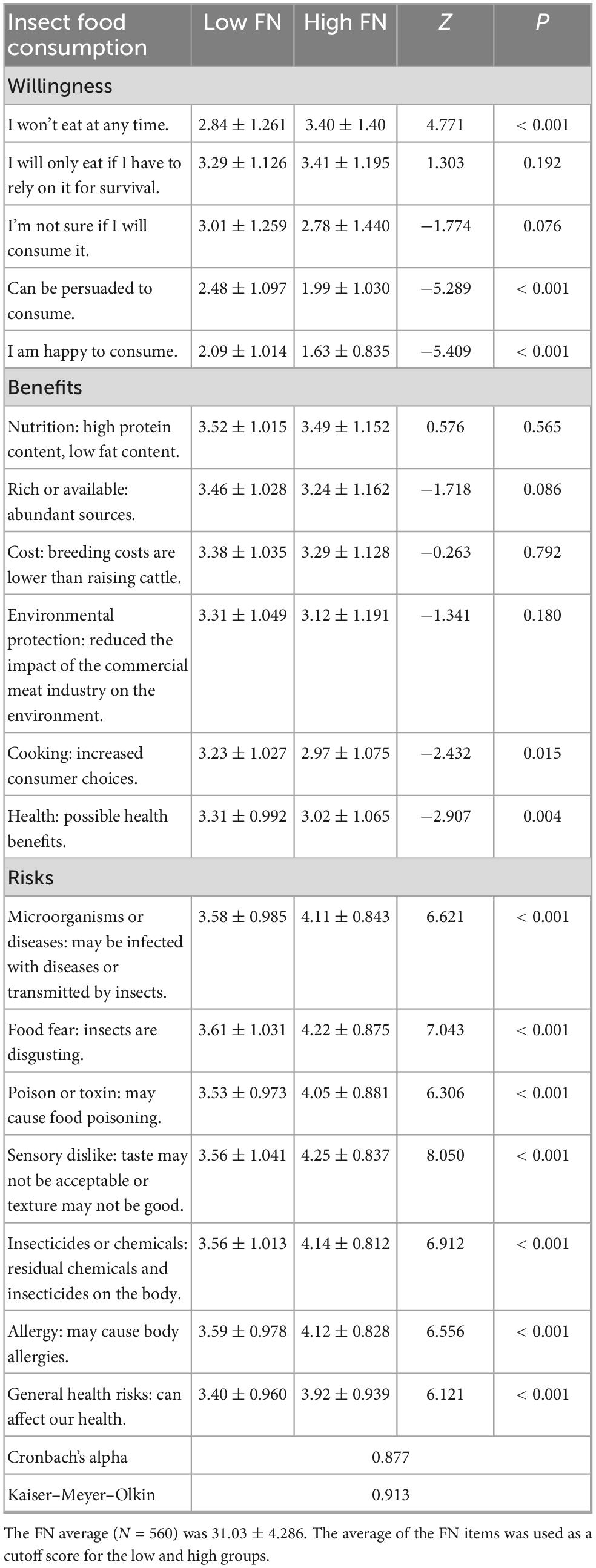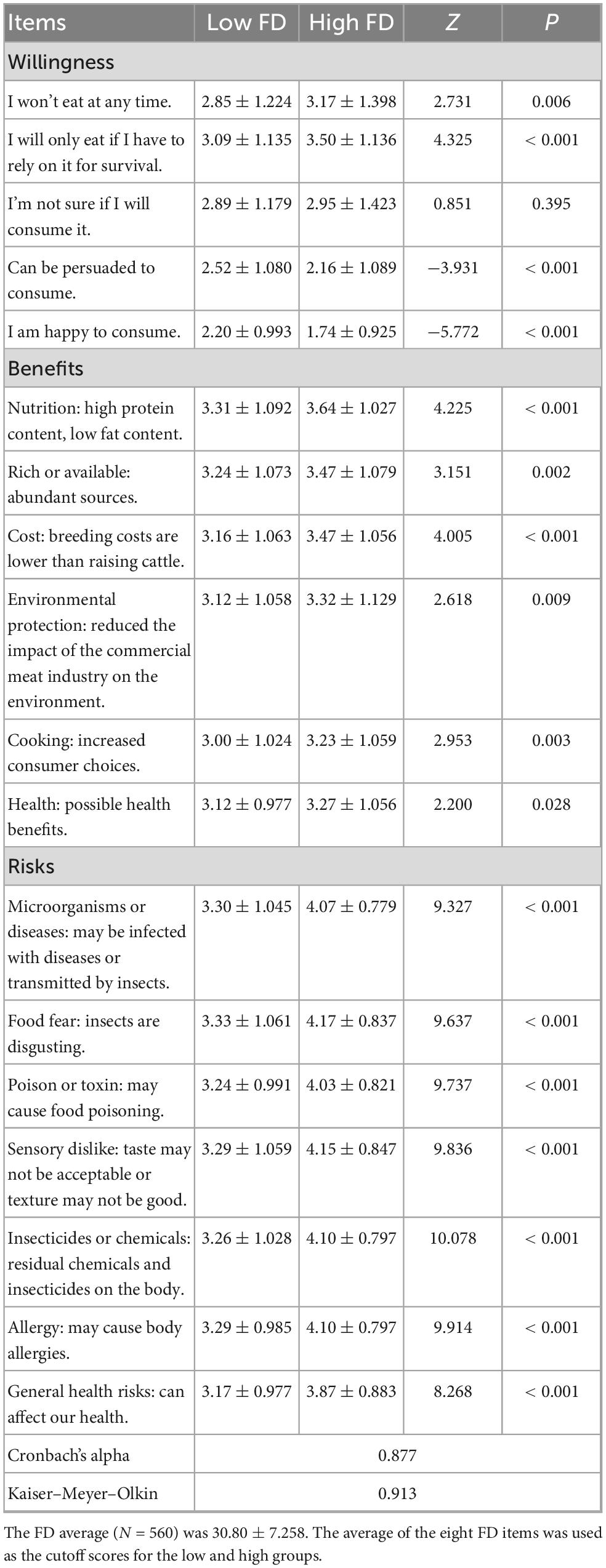- 1College of Life Science, Xinyang Normal University, Xinyang, China
- 2School of Marxism, Xinyang Normal University, Xinyang, China
Introduction: Edible insects with high protein content are sufficient to meet the growing global demand for protein. However, some individuals have negative psychological reactions such as phobia and disgust toward insect foods; therefore, the large-scale promotion of insect foods has progressed slowly. This study investigated the impact of food neophobia and food disgust on the willingness, benefits, and risks of insect food consumption among Chinese university students.
Methods: In 2023, 560 university students aged 18–25 years were recruited to fill an online questionnaire. The data were analyzed using a Mann–Whitney U test.
Results: Most university students were unfamiliar and unwilling to consume insect foods, with higher levels of food neophobia and disgust indicating greater unwillingness to consume insect foods. Regardless of food neophobia and disgust levels, both groups agreed on the benefits of consuming insect foods and believed that consuming insect foods carried high risks.
Conclusion: These findings underscored the significance of promoting and enhancing positive cognitions surrounding insect foods, and eliminating negative stereotypes about insect foods, especially those university students with high food neophobia or disgust. In addition, the findings provide reference for studying the psychological mechanism of insect food consumption and guiding young people to consume insect foods.
1 Introduction
As global population grows and resources diminish, humans face the double pressure of biological resource shortage and environmental pollution. Therefore, seeking new alternative protein resources is necessary for sustainable development (1). Edible insects have high protein and nutritional value, which can help solve the problems of global malnutrition and food insecurity (2). Insect consumption is a traditional practice in several countries (3). Apart from Europe and North America, approximately 1,500–2,000 species of insects and other invertebrates are consumed by 3,000 ethnic groups across 113 countries in Asia, Australia, and Central and South America (4).
However, in Western societies where a culture of insect consumption does not exist, there is a traditional culture of feeling disgusts over the idea of consuming insects (5). Disgust is a negative emotion that belongs to the category of basic emotions and is often cited as a primary psychological factor in the rejection of insect-based foods. People in Western societies mistakenly classify insects as a pathogen risk and food pollutants, which is the main reason they generally feel aversion toward foods containing insects (6). Such disgust may also be due to insect foods’ peculiar appearance, especially the sharp or rough shells, barbed needles, wings, and spines of protozoan insect foods. Some insects are soft and slippery, such as a puddle of mush, and the idea of eating them may cause discomfort.
Disgust toward insect foods may also be associated with food neophobia (FN) (7). FN has not yet been classified as a disease but represents a persistent irrational fear of insects and the desire to avoid or run away from them (8, 9). The tendency toward FN is usually a personal choice, but may also manifest as a result of cultural influences, lack of exposure to particular foods, or inherited beliefs (10). Studies have confirmed that consumer familiarity is an important and determining factor in shaping positive attitudes toward edible insect consumption (11, 12), which makes it easier for consumers to accept insect food (13, 14). For example, research on insect consumption among communities in western Kenya has shown that young people, especially those in urban markets, have little knowledge of edible insect species, and therefore find it more difficult to accept insects as a source of food (15).
However, European culture often views insects as dirty, disgusting, dangerous or vectors of disease (16). Such negative attitudes may lead to a greater fear of new insect foods, which may negatively affect consumers’ perceptions and willingness to eat food, even if the insect food is a healthy and sustainable food choice (17). FN for insect foods limits dietary diversity and negatively affects the acceptance of new and unfamiliar foods (18). FN, perceived aversion or disgust, concerns about safety risks, and poor sensory quality are the main reasons for negative psychological reactions of fear or aversion to insect foods (19).
The tradition of eating insects in China can be traced back over 3,000 years. Insects are a source of protein and are generally considered healthier and more sustainable alternatives to meat. Eating insect foods is a potential solution to address malnutrition and food insecurity in China (20). Compared with Germans, Chinese people have a more favorable attitude toward and are more willing to eat insect food. FN has a significant impact on the willingness of Chinese and German individuals to eat insect foods (21). Disgust and phobia pose obstacles to spreading the practice of insects consumptions, but stimulating positive emotions can help overcome these psychological barriers (22).
Evaluating young people’s acceptance of new foods such as insect foods is especially important. Driven by curiosity and low risk, they may become the target audience for new food consumption (23). Spanish university students recognize the high nutritional value of insects, particularly their protein content. Advertising and insect knowledge are important factors that influence insect food consumption (24). Polish university students have a low willingness to use edible insects as meat substitutes (25), and the health and quality related characteristics of insect foods are the main factors influencing their willingness to purchase them. College students without FN have a positive attitude toward purchasing foods containing edible insects as ingredients (26). Furthermore, French students are more willing to eat insects than Irish students; however, FN and food aversion or food disgust (FD) are their main obstacles to eating insects (27). Few studies have examined the psychological mechanisms of the acceptance and rejection of insects, especially the attitudes and behaviors of university students in China toward insect foods.
These findings can fill the existing literature gap in Chinese college students’ familiarity with and willingness to consume insect food, and provide initial insights for a deeper understanding of students’ cognitions about, acceptance of, and motivations for consuming insect food. The results are expected to contribute to the psychological mechanism of insect food consumption and the healthy development of this industry, providing theoretical basis for formulating corresponding policies and regulations.
2 Materials and methods
2.1 Study design
This non-experimental study used quantitative research methods. Online questionnaires were used to collect data exploring the impact of FN and FD on university students’ willingness to consume insect foods and perceptions of benefits and risks of insect food consumption. The online questionnaires were created using Wenjuanxing, which is an online survey platform that provides various data collection and analysis functions. The study was conducted from April to July 2023.
2.2 Participants
Individuals participated voluntary (N = 572) were anonymously recruited through WeChat groups of Xinyang Normal University to complete online questionnaires. Voluntary participants only needed to click on the questionnaire link or QR code on their smartphones or computers to participate freely and independently. All participants were native Mandarin speakers and students of Xinyang Normal University. If they did not complete the questionnaire (e.g., incomplete answers to questions, missing demographic information, answering some questions instead of all, or responding with the same option for all questions), they were excluded from the study. Finally, 560 participants aged 18–25 years were selected (response rate: 97.90%). The participants were predominantly female (68.8%), with an average age of 19.25 ± 1.19 years (Table 1).
2.3 Data collection
The data were collected through an online questionnaire created using Wenjuanxing. All participants completed the questionnaire, which included the FN scale (Supplementary Table 1), FD scale (Supplementary Table 2), and items for the willingness to consume insect foods, benefits and risks of insect food consumption, and demographic information (Supplementary Table 3). The following three items were also included: (1) Are you familiar with insect foods? (2) Please choose which insect foods you frequently consume. (3) Please list the possible reasons for not eating insect foods (Supplementary Table 4).
2.4 Data analysis
Data were analyzed using SPSS V20 (IBM, Armonk, NY, United States), and significant differences between the variables were identified using the Mann–Whitney U test. To study the impacts of FN and FD on the willingness, benefits, and risks of insect food consumption, the averages of 10 FN items and 8 FD items were used separately as cutoff scores. Scores ≥ 31 represented the high FN group, and scores < 31 represented the low FN group. Similarly, scores ≥ 30 represented the high FD group, and scores < 30 represented the low FD group. The overall Kaiser–Meyer–Olkin (KMO) value was 0.910, and the Cronbach’s alpha was 0.873, indicating the excellent reliability and validity of the questionnaire.
2.5 Ethics approval
This study was conducted in compliance with the principles of the Declaration of Helsinki. All procedures relevant to the study participants were approved by the Xinyang Normal University Ethics Committee (Approval Number: XFEC-2023-025).
2.6 Informed consent
Participation in the study was voluntary. All participants were informed of the study objective and context, and they provided written informed consent for privacy and information management policies.
3 Results
3.1 University students’ familiarity with and consumption of insect foods
As shown in Figure 1, 37.7% of university students were very unfamiliar with insect foods, and 32.3% were unfamiliar with insect foods. Only 5.6% of the participants were familiar with insect food. Figure 2 shows the insect foods eaten most commonly by Chinese university students. Approximately 23.04% (n = 129) of the participants reported that cicada and silkworm pupae were the most commonly eaten insect foods. Additionally, 66.79% (n = 374) reported that they had never consumed insect food, which was a relatively high proportion. Unfamiliarity with and disgust toward insect food were the two main reasons for not consuming insect food (Figure 3).
Tables 2, 3 present participants’ levels of FN and FD. Table 4 showed the results of the in-depth analysis, revealing that the FN (30.50 ± 3.780) of participants who were unfamiliar with insect food was lower than the average (31.03 ± 4.286); however, the FD (31.35 ± 5.794) was higher than the average (30.80 ± 7.258). Furthermore, the FN (31.87 ± 4.836) and FD (31.06 ± 7.716) of participants who were disgusted with insect food were higher than the averages (31.03 ± 4.286 and 30.80 ± 7.258, respectively).
In short, most university students were unfamiliar with and unwilling to consume insect foods. The groups of university students who were unfamiliar with or felt disgusted by insect foods had a higher FD than the average. Particularly, the FN and FD of university students who were disgusted by insect food were higher than the average.
3.2 Impact of FN on willingness, benefits, and risks of insect food consumption
As shown in Table 5, university students had a lower willingness to consume insect foods, especially the high FN group. University students in the high FN group were significantly more unwilling to consume insect foods at any time (P < 0.001). However, when in danger and having to rely on insect food for survival, both the high and low FN groups were willing to consume insect food, with no significant difference between the two groups (P = 0.192). The low FN group was more likely to be persuaded to consume insect food or voluntarily do so.
For the benefits of consuming insect food, no significant difference existed between the high and low FN groups in the five dimensions of insect food nutrition (P = 0.565), abundant sources (P = 0.086), cost (P = 0.792), environmental protection (P = 0.180), and no benefits (P = 0.622). However, significant differences were observed between the two groups for the cooking (P = 0.015) and health (P = 0.004) dimensions. The groups also differed significantly in the eight risk dimensions associated with the consumption of insect foods (P < 0.001). The higher FN indicated a higher perceived risk of consuming insect foods.
Overall, university students in the high FN group were less willing to consume insect-based foods than those in the low FN group. Both groups agreed on the benefits of insect foods but believed that consuming insect foods had higher risks.
3.3 Impact of FD on willingness, benefits, and risks of insect food consumption
University students’ FD affected their willingness to consume insect food and perceptions of the benefits and risks of insect food consumption (Table 6). University students in the high FD group were more unwilling to consume insect foods at any time than those in the low FD group, unless their survival was threatened. In both cases, significant differences were observed between the two groups. When university students have low levels of FD, they may voluntarily try or be persuaded by others to consume insect-based food. However, when in danger and having to rely on insect food for survival, both groups were willing to consume insect food, with a significant difference between the two (P < 0.001).
Regarding the benefits of consuming insect foods, the high FD group believed that the nutrition, sources, cost, environmental protection, cooking, and health aspects of insect foods were higher compared with the perceptions of the low FD group. Furthermore, there were significant differences between the two groups across these dimensions. This was also reflected in the risk of consuming insect foods in the high and low FD groups.
Overall, among university students, the high FD group was more unwilling to consume insect foods than the low FD group. Both groups agreed on the benefits of insect foods but also believed that consuming insect foods had higher risks.
4 Discussion
In Asian countries, especially in parts of China, Thailand, and India, as well as in parts of Latin America and Africa, consumers have a custom of consuming insect foods based on tradition and dietary preferences. The consumption of edible insect foods is a sustainable alternative to traditional meat, and has reached a global consensus (28).
Experiencing disgust toward insect foods is a primary obstacle to the consumption of insect foods in Western countries (29). Disgust is an oral sensation or mental aversion caused by something dirty or disgusting. It manifests itself as distancing oneself from certain disgusting and potentially dangerous objects, events or situations, and is conceptualized as an adaptive response that can be changed based on information and life experiences (30). Consumers’ fear of unfamiliar food (FN) limits their likelihood of consuming insects (13). According to reports, the level of FN among Chinese college students is relatively high (31, 32), which is measured using the FN Scale (33). In this study, only 5.6% of college students were familiar with insect foods. Even in China, which has a tradition of consuming insect food, most Chinese college students were unfamiliar with insect food, which may be an important factor influencing college students’ unwillingness to consume. FN and the disgust or aversion toward or fear of insect foods has the strongest impact on respondents’ willingness and intention to consume insect foods (34). Furthermore, unfamiliarity with insect food exacerbates FN and FD toward insect food.
Therefore, to eliminate negative stereotypes about insect foods, positive cognitions surrounding insect foods must be maximized (35). Individual acceptance of new foods largely depends on their level of fear toward them. Consumers must be offered more opportunities to breed or contact with edible insects (36) and taste insect foods to improve their acceptability (37). Chefs can provide customers with a positive insect foods based cooking experience, thereby increasing their acceptance of insect foods (38). Such positive experiences can alleviate the negative perceptions of insect foods and cultivate positive attitudes toward insect foods. Furthermore, social media platforms should be used as potential tools for nutrition education on edible insect foods in the human diet to increase publicity efforts in favor of insect foods, transform personal ways of thinking, and make consumers believe that the insect foods made from edible insects are enticing and nutritious, instead of being considered ugly; this can maximize insect foods’ public awareness and acceptance (39). Consumers’ health literacy potentially influences their willingness to consume insect-based foods (40). Canadian high school students’ acceptance of edible insect foods increased substantially after participating in an educational insect-farming program (41).
Attention should be paid to innovations in the taste and cooking methods of insect-based foods. Through careful processing and packaging, insect foods can be portrayed as a high-end healthy food, substantially overcoming the original appearance of insect foods (42, 43). This can help reduce consumers’ fear and nausea of new foods and attract consumers who value the nutritional value of insect foods (44). Visual appearance plays an important role in influencing consumers’ acceptance of insects as food (45). Participants from France and Ireland prefer to consume delicious or disguised (invisible) insect foods rather than insects presented in their usual form (whole) (27). On 21 January 2025, according to the official announcement of the European Union, the European Commission issued Regulation (EU) No. 2025/89, approving UV-treated whole yellow mealworm powder as a new type of food to be put on the market for use in various food products, such as cheese, jam, and bread. This was in accordance with Regulation (EC) No 2015/2283 of the European Parliament and the Council.
Finally, ensuring the health and safety of insect-based foods is important. The risks of consuming insect foods are the same as those of consuming other protein sources, including biological risks (bacteria, viruses, and parasites), chemical risks (heavy metals, toxins, and pesticides), and allergens related to the environment (46). Heterologous proteins in insects are more likely to cause allergies than dairy and meat proteins, and some individuals may develop allergic reactions to insect-based foods. Insect viruses and bacterial risks can be controlled through modern processing. Currently, insect food regulatory agencies and related regulations are lacking worldwide. Therefore, it is necessary to improve the market supervision mechanisms to ensure the quality and safety of insect foods.
4.1 Limitations
This study had some limitations. First, the 560 university students in the sample were from one university in China, which could not provide an overview of the impact of FN and FD on insect food consumption among Chinese university students. Second, the online self-report questionnaire may have led to some bias in the survey results. However, the heterogeneity of university students with different majors and places of residences still provide insights into their insect food consumption. Future research should focus on the following aspects. First, the main communication factors (e.g., social media publicity, peer influence, internet communication, or a combination of these) of Chinese university students’ insect FD or FN should be examined. Second, cutting-edge technologies, such as artificial intelligence and wearable devices, should be adopted to study the intensity and dynamic changes in college students’ fear or disgust surrounding different insect foods as well as their impact on psychological emotions. This can help break through the singularity and bias of self-assessment questionnaires (47, 48).
5 Conclusion
This study aimed to evaluate the impact of FN and FD on university students’ willingness, benefits, and risks of insect food consumption. Overall, most university students were unfamiliar with insect foods and unwilling to consume them, especially those with high levels of FN and FD. Regardless of the FN and FD levels, both the high and low groups agreed on the benefits of consuming insect foods but had higher risk perceptions of consuming insect foods. In the future, the government, universities, colleges, and communities will have to promote and enhance the positive cognitions surrounding insect foods among university and college students and their parents through lectures, practical experiences, and social media. They will also be required to eliminate negative stereotypes about insect foods, adopt scientific and technological innovation to ensure the health and safety of insect foods, minimize the consumption risks of insect foods, and increase students’ willingness to consume insect foods, especially those with high FN or FD.
Data availability statement
The original contributions presented in this study are included in this article/Supplementary material, further inquiries can be directed to the corresponding author.
Author contributions
HT: Data curation, Methodology, Funding acquisition, Writing – review and editing. JC: Investigation, Writing – original draft, Methodology.
Funding
The authors declare that financial support was received for the research and/or publication of this article. This work was supported by the Nanhu Scholars Program for Young Scholars of XYNU (Xinyang Normal University, China).
Conflict of interest
The authors declare that the research was conducted in the absence of any commercial or financial relationships that could be construed as a potential conflict of interest.
Generative AI statement
The authors declare that no Generative AI was used in the creation of this manuscript.
Correction note
This article has been corrected with minor changes. These changes do not impact the scientific content of the article.
Publisher’s note
All claims expressed in this article are solely those of the authors and do not necessarily represent those of their affiliated organizations, or those of the publisher, the editors and the reviewers. Any product that may be evaluated in this article, or claim that may be made by its manufacturer, is not guaranteed or endorsed by the publisher.
Supplementary material
The Supplementary Material for this article can be found online at: https://www.frontiersin.org/articles/10.3389/fnut.2025.1613932/full#supplementary-material
Abbreviations
US, university students; FN, food neophobia; FD, food disgust.
References
1. Mishyna M, Chen JS, Ofir BJM. Sensory attributes of edible insects and insect-based foods – Future outlooks for enhancing consumer appeal. Trends Food Sci Technol. (2020) 2020:141–8. doi: 10.1016/j.tifs.2019.11.016
2. Liu Y, Kim S. Exploring insect-based food consumption experiences and their consequences in a mature entomophagous community. Br Food J. (2024) 126:2686–713. doi: 10.1108/BFJ-09-2023-0800
3. Omuse ER, Tonnang HEZ, Yusuf AA, Machekano H, Egonyu JP, Kimathi E, et al. The global atlas of edible insects: Analysis of diversity and commonality contributing to food systems and sustainability. Sci Rep. (2024) 14:5045. doi: 10.1038/s41598-024-55603-7
4. Liu AJ, Li J, Gomez MI. Factors influencing consumption of edible insects for Chinese consumers. Insects. (2019) 11:10. doi: 10.3390/insects11010010
5. Orkusz A, Orkusz M. Edible insects in Slavic culture: Between tradition and disgust. Insects. (2024) 15:306. doi: 10.3390/insects15050306
6. Jensen NH, Lieberoth A. We will eat disgusting foods together—Evidence of the normative basis of Western entomophagy-disgust from an insect tasting. Food Qual Prefer. (2019) 72:109–15. doi: 10.1016/j.foodqual.2018.08.012
7. Alley TR. 9-Conceptualization and measurement of human food neophobia. In: S. Reilly editor. Food Neophobia: Behavioral and Biological Influences. Cambridge: Woodhead Publishing (2018). p. 169–92. doi: 10.1016/B978-0-08-101931-3.00009-4
8. Fukano Y, Soga M. Evolutionary psychology of entomophobia and its implications for insect conservation. Curr Opin Insect Sci. (2023) 59:101100. doi: 10.1016/j.cois.2023.101100
9. Coulthard H, Aldridge V, Fox G. Food neophobia and the evaluation of novel foods in adults; the sensory, emotional, association (SEA) model of the decision to taste a novel food. Appetite. (2022) 168:105764. doi: 10.1016/j.appet.2021.105764
10. Woolf E, Zhu Y, Emory K, Zhao J, Liu C. Willingness to consume insect-containing foods: A survey in the United States. LWT. (2018) 102:100–5. doi: 10.1016/j.lwt.2018.12.010
11. Orsi L, Voege LL, Stranieri S. Eating edible insects as sustainable food? Exploring the determinants of consumer acceptance in Germany. Food Res Int. (2019) 125:108573. doi: 10.1016/j.foodres.2019.108573
12. Tolve R, Zanoni M, Sportiello L, Musollini S, Tchuenbou-Magaia LF, Favati F. From fear to fork—exploring food neophobia and the inclination towards entomophagy in Italy. Int J Food Sci Technol. (2025) 60:vvae047. doi: 10.1093/ijfood/vvae047
13. Olum S, Wesana J, Mawadri J, Nakiranda JK, Odongo W. Insects as food: Illuminating the food neophobia and socio-cultural dynamics of insect consumption in Uganda. Int J Trop Insect Sci. (2021) 41:1–10. doi: 10.1007/s42690-020-00309-2
14. Alhujaili A, Nocella G, Macready A. Insects as food: Consumers’ acceptance and marketing. Foods. (2023) 12:886. doi: 10.3390/foods12040886
15. Owidi E, Asoka G, Waga E, Ochieng’ A, Kawaka F. Consumer attitudes and perceptions on consumption of edible insects among communities in western Kenya. PLoS One. (2025) 20:e0318711. doi: 10.1371/journal.pone.0318711
16. Belluco S, Bertola M, Montarsi F, Di Martino G, Granato A, Stella R, et al. Insects and public health: An overview. Insects. (2023) 14:240. doi: 10.3390/insects14030240
17. Vartiainen O, Elorinne AL, Niva M, Vaisanen P. Finnish consumers’ intentions to consume insect-based foods. J Insects Food Feed. (2020) 6:261–72. doi: 10.3920/jiff2019.0042
18. Costa E, Niimi J, Collier ES. The negative association between food neophobia and sensory expectations revealed through analysis of consumers’ open-ended descriptions of seafood. Food Qual Prefer. (2024) 123:105332. doi: 10.1016/j.foodqual.2024.105332
19. Cinar C, Karinen AK, Tybur JM. The multidimensional nature of food neophobia. Appetite. (2021) 162:105177. doi: 10.1016/j.appet.2021.105177
20. Lin X, Wang F, Lu Y, Wang J, Chen J, Yu Y, et al. A review on edible insects in China: Nutritional supply, environmental benefits, and potential applications. Curr Res Food Sci. (2023) 7:100596. doi: 10.1016/j.crfs.2023.100596
21. Hartmann C, Shi J, Giusto A, Siegrist M. The psychology of eating insects: A cross-cultural comparison between Germany and China. Food Qual Prefer. (2015) 44:148–56. doi: 10.1016/J.FOODQUAL.2015.04.013
22. Marquis D, Carvalho FR, Pantin-Sohier G. Assessing the effect of baby schema cuteness on emotions, perceptions and attitudes towards insect-based packaged foods. Br Food J. (2024) 126:1492–509. doi: 10.1108/BFJ-01-2023-0017
23. Conti C, Costa A, Balzaretti CM, Russo V, Tedesco DEA. Survey on food preferences of University Students: From tradition to new food customs? Agriculture. (2018) 8:155. doi: 10.3390/agriculture8100155
24. Cantalapiedra F, Juan-Garcia A, Juan C. Perception of food safety associated with entomophagy among higher-education students: Exploring insects as a novel food source. Foods. (2023) 12:4427. doi: 10.3390/foods12244427
25. Orkusz A, Wolanska W, Harasym J, Piwowar A, Kapelko M. Consumers’ attitudes facing entomophagy: Polish case perspectives. Int J Environ Res Public Health. (2020) 17:2427. doi: 10.3390/ijerph17072427
26. Mikulec AT, Platta AM, Radzyminska M, Ruszkowska M, Mikulec K, Suwała G, et al. Attitudes and purchase intentions of polish university students towards food made from insects—A modelling approach. PLoS One. (2024) 19:e0300871. doi: 10.1371/journal.pone.0300871
27. Ranga L, Vishnumurthy P, Dermiki M. Willingness to consume insects among students in France and Ireland. Ir J Agric Food Res. (2024) 62:108–29. doi: 10.15212/ijafr-2023-0106
28. Sogari G, Menozzi D, Mora C. Exploring young foodies’ knowledge and attitude regarding entomophagy: A qualitative study in Italy. Int J Gastron Food Sci. (2017) 7:16–9. doi: 10.1016/j.ijgfs.2016.12.002
29. La Barbera F, Verneau F, Videbæk PN, Amato M, Grunert KG. A self-report measure of attitudes toward the eating of insects: Construction and validation of the Entomophagy Attitude Questionnaire. Food Qual Prefer. (2020) 79:103757. doi: 10.1016/j.foodqual.2019.103757
30. Cicatiello C, De Rosa B, Franco S, Lacetera N. Consumer approach to insects as food: Barriers and potential for consumption in Italy. Br Food J. (2016) 118:2271–86. doi: 10.1108/BFJ-01-2016-0015
31. Tian H, Chen J. Food neophobia and intervention of university students in China. Food Sci Nutr. (2021) 9:6224–31. doi: 10.1002/fsn3.2575
32. Tian H, Chen J. Associations among online health information seeking behaviors, electronic health literacy and food neophobia: A cross-sectional study. Inquiry. (2023) 60:469580231217982. doi: 10.1177/00469580231217982
33. Zhao JB, Gao ZB, Li YX, Wang Y, Zou LQ. The food neophobia scale (FNS): Exploration and confirmation of factor structure in a healthy Chinese sample. Food Qual Prefer. (2020) 79:103791. doi: 10.1016/j.foodqual.2019.103791
34. Shelomi M. Factors affecting willingness and future intention to eat insects in students of an edible insect course. J Insects Food Feed. (2023) 9:865–76. doi: 10.3920/JIFF2022.0084
35. Sidali KL, Pizzo S, Garrido-Perez EI, Schamel G. Between food delicacies and food taboos: A structural equation model to assess Western students’ acceptance of Amazonian insect food. Food Res Int. (2019) 115:83–9. doi: 10.1016/j.foodres.2018.07.027
36. Fiebelkorn F, Puchert N, Dossey AT. An exercise on data-based decision making: Comparing the sustainability of meat & edible insects. Am Biol Teacher. (2020) 82:522–8. doi: 10.1525/abt.2020.82.8.522
37. Naranjo-Guevara N, Fanter M, Conconi AM, Floto-Stammen S. Consumer acceptance among Dutch and German students of insects in feed and food. Food Sci Nutr. (2020) 9:414–28. doi: 10.1002/fsn3.2006
38. Dion-Poulin A, Turcotte M, Lee-Blouin S, Perreault V, Provencher V, Doyen A, et al. Acceptability of insect ingredients by innovative student chefs: An exploratory study. Int J Gastronomy Food Sci. (2021) 24:100362. doi: 10.1016/j.ijgfs.2021.100362
39. Mancini S, Moruzzo R, Riccioli F, Paci G. European consumers’ readiness to adopt insects as food. A review. Food Res Int. (2019) 122:661–78. doi: 10.1016/j.foodres.2019.01.041
40. Lorini C, Ricotta L, Vettori V, Del Riccio M, Biamonte MA, Bonaccorsi G. Insights into the predictors of attitude toward entomophagy: The potential role of health literacy: A cross-sectional study conducted in a sample of students of the University of Florence. Int J Environ Res Public Health. (2021) 18:5306. doi: 10.3390/ijerph18105306
41. Marquis D. Targeting adolescents as agents of change for an entomophageous future. Br Educ Res J. (2023) 49:1161–86. doi: 10.1002/berj.3891
42. Bartkowicz J, Babicz-Zielinska E. Acceptance of bars with edible insects by a selected group of students from Tri-City, Poland. Czech J Food Sci. (2020) 38:192–7. doi: 10.17221/236/2019-CJFS
43. Meyer-Rochow VB, Hakko H. Can edible grasshoppers and silkworm pupae be tasted by humans when prevented to see and smell these insects? J Asia-Pac Entomol. (2018) 21:616–9. doi: 10.1016/j.aspen.2018.04.002
44. da Silva CBF, Tavares ER, Pimentel TC, Pagani MM, Marsico ET, Cruz AG, et al. The impact of information on the perception, emotional profile, and insights of Brazilian pet owners with different degrees of entomophobia. Food Qual Prefer. (2023) 110:104967. doi: 10.1016/j.foodqual.2023.104967
45. Mandolesi S, Naspetti S, Zanoli R. Exploring edible insects’ acceptance through subjective perceptions: A visual Q study. J Insects Food Feed. (2022) 8:565–77. doi: 10.3920/JIFF2021.0016
46. Chomchai S, Chomchai C. Histamine poisoning from insect consumption: An outbreak investigation from Thailand. Clin Toxicol. (2018) 56:126–31. doi: 10.1080/15563650.2017.1349320
47. Umapathi R, Park B, Sonwal S, Rani G, Cho Y, Huh YS. Advances in optical-sensing strategies for the on-site detection of pesticides in agricultural foods. Trends Food Sci Technol. (2022) 119:69–89. doi: 10.1016/j.tifs.2021.11.018
Keywords: food neophobia, food disgust, insect food, familiarity, willingness
Citation: Tian H and Chen J (2025) Association of food neophobia and food disgust with the willingness, benefits, and risks of insect food consumption among Chinese university students. Front. Nutr. 12:1613932. doi: 10.3389/fnut.2025.1613932
Received: 18 April 2025; Accepted: 20 June 2025;
Published: 14 July 2025;
Corrected: 21 July 2025.
Edited by:
Nobuyuki Sakai, Tohoku University, JapanReviewed by:
Alessandro Tonacci, National Research Council (CNR), ItalyMartina Bednářová, Mendel University in Brno, Czechia
Copyright © 2025 Tian and Chen. This is an open-access article distributed under the terms of the Creative Commons Attribution License (CC BY). The use, distribution or reproduction in other forums is permitted, provided the original author(s) and the copyright owner(s) are credited and that the original publication in this journal is cited, in accordance with accepted academic practice. No use, distribution or reproduction is permitted which does not comply with these terms.
*Correspondence: Hua Tian, eHludTA4MThAMTYzLmNvbQ==
 Hua Tian
Hua Tian Jie Chen
Jie Chen